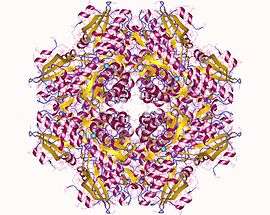Chloromuconate cycloisomerase
| chloromuconate cycloisomerase | |||||||||
|---|---|---|---|---|---|---|---|---|---|
|
Chloromuconate cycloisomerase oktamer, Rhodococcus opacus | |||||||||
| Identifiers | |||||||||
| EC number | 5.5.1.7 | ||||||||
| CAS number | 95990-33-3 | ||||||||
| Databases | |||||||||
| IntEnz | IntEnz view | ||||||||
| BRENDA | BRENDA entry | ||||||||
| ExPASy | NiceZyme view | ||||||||
| KEGG | KEGG entry | ||||||||
| MetaCyc | metabolic pathway | ||||||||
| PRIAM | profile | ||||||||
| PDB structures | RCSB PDB PDBe PDBsum | ||||||||
| Gene Ontology | AmiGO / EGO | ||||||||
| |||||||||
In enzymology, a chloromuconate cycloisomerase (EC 5.5.1.7) is an enzyme that catalyzes the chemical reaction
- 2-chloro-2,5-dihydro-5-oxofuran-2-acetate 3-chloro-cis,cis-muconate
Hence, this enzyme has one substrate, 2-chloro-2,5-dihydro-5-oxofuran-2-acetate, and one product, 3-chloro-cis,cis-muconate.
This enzyme belongs to the family of isomerases, specifically the class of intramolecular lyases. The systematic name of this enzyme class is 2-chloro-2,5-dihydro-5-oxofuran-2-acetate lyase (decyclizing). This enzyme is also called muconate cycloisomerase II. This enzyme participates in gamma-hexachlorocyclohexane degradation and 1,4-dichlorobenzene degradation. It employs one cofactor, manganese.
Structural studies
As of late 2007, 3 structures have been solved for this class of enzymes, with PDB accession codes 1CHR, 1NU5, and 2CHR.
References
- Schmidt E, Knackmuss HJ (1980). "Chemical structure and biodegradability of halogenated aromatic compounds. Conversion of chlorinated muconic acids into maleoylacetic acid". Biochem. J. 192 (1): 339–47. PMC 1162339
 . PMID 7305906.
. PMID 7305906.
